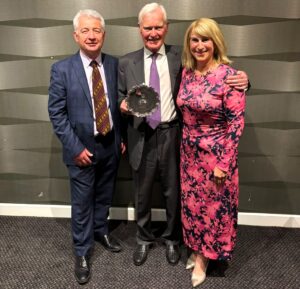As MPs predict post-lockdown spike in knife crime, and offences in Wales rise by a fifth, charity calls for nationwide education

Empire Fighting Chance (EFC) is calling for early education on the dangers of carrying knives after knife-related incidents were found to have risen by a fifth in Wales in the space of a year – and ahead of a predicted post-lockdown spike in knife-crime among young people.
A new report from The Youth Violence Commission says knife crime could spike as children who witnessed domestic violence are released from lockdown*, while recent figures from the Office of National Statistics (ONS) show knife related incidents in Wales increased by 19% over the course of just 12 months from 2018-19**.
In light of the worrying statistics – and following the recent conviction of Momodoulamin Saine, who stabbed 21-year-old Asim Khan on St Mary’s Street in Cardiff last August – local boxing charity EFC is calling for deeper community engagement to help address the issues involved.
EFC founder Martin Bisp explained: “In our experience, knife crime isn’t something that can be policed out of existence. Whilst stop and search may have a place, this combined with aggressive policing will not prevent young people from carrying knives.”
“We are continually told by the young people we coach that fear of being stopped by the police is less than the fear of being attacked by someone else, and so the problem continues.”
Martin and his EFC co-founder Jamie Sanigar are subsequently encouraging early, community wide engagement on tackling knife crime as an alternative to police stop and search methods, which have also come under increased scrutiny.
“To effect real change, we need to make it culturally unacceptable to carry a knife, with zero excuses, zero credibility and full education around the effects,” Martin continued. “This will only come from early, community-wide engagement that includes policing, education in schools, community groups and input from the medical professions.”
The Office for National Statistics’ figures reveal that knife and sharp instrument offences rose by 45% in Dyfed-Powys police area, by over a quarter in Gwent, by 17% in South Wales and by 4% in the North Wales police area from year end 2018-19.
Empire Fighting Chance meanwhile helps deprived youngsters change their lives through boxing so that more vulnerable young people can overcome personal, behavioural and social difficulties.
EFC co-founder Jamie Sanigar added: “Since 2013, the number of offences committed in England and Wales involving knives has risen steadily by more than 20,000 – a percentage increase of 80%. Figures like these simply cannot be ignored and we as a society need to look at what more can be done to tackle knife crime in our communities.”
“It’s time we adopted the public health model and worked together as a society to educate and protect our youngest members from the offset, rather than tackling individual cases as they happen.”
Jamie added: “By openly acknowledging the problem, having honest and authentic conversations around the realities of knife crime, and ultimately investing in the communities that have so frequently been ravaged by years of cuts and austerity, we can start to make a change from the ground up.”
“It’s never easy, but accepting that there is no quick fix and that this will be a lengthy process of education, patience and understanding seems the only way we will make a consistent and lasting difference to knife crime, not just in Wales but across the UK.”
Empire Fighting Chance operates across 14 sites in south Wales, including those in Gwent, Merthyr Tydfil, Barry, Cardiff and Rhondda Cynon Taff. Here, they work with youngsters from deprived backgrounds who are experiencing behavioural and psychological issues. Many have been excluded from school or have turned to anti-social or criminal behaviour.
The charity, which has former British Lion and Welsh rugby union and league star Tommy David and former World Champion Lee Selby as its Welsh ambassadors, started as a small boxing project 12 years ago and has now grown to provide over 4,000 young people the chance to harness the power of sport to overcome personal, behavioural and social difficulties.





